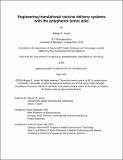| dc.description.abstract | Supramolecular biomaterials, which are capable of spontaneous assembly via diverse non- covalent interactions, represent an exciting frontier in drug delivery due to their ease of formulation and modularity. Tannic acid (TA) is a naturally-occurring compound that has a demonstrated ability to engage in supramolecular interactions with biological cargo, including proteins, nucleic acids, and cell membranes. In this thesis, we harnessed the broad bio-adhesive capacity of TA to develop scalable, modular systems for vaccine engineering across various applications.
Building upon previous work utilizing TA-containing metal phenolic networks for cell membrane engineering, we fabricated a cell membrane-bound formulation for local drug delivery to dendritic cell (DC) vaccines termed META (Membrane Engineering using Tannic Acid). DC vaccines hold great potential for a spectrum of diseases including cancer and autoimmune conditions, and combination drug delivery is an attractive strategy to manipulate their function and overcome in vivo plasticity. However, DCs are not compatible with particle-based local delivery approaches due to their broad phagocytic capacity. We showed that META preserved DC viability and critical functions such as migration, and then demonstrated the capacity of the system to incorporate and release protein cargoes with varying physical properties alone and in combination. Finally, we showed that META carrying either pro- or anti-inflammatory cargo could influence the carrier cell phenotype accordingly, underscoring the potential of META for the local control of phagocytic immune cells in a next step to advance DC therapies in the clinic.
In the main portion of this work, we used TA to modulate the delivery kinetics of subunit vaccines to enhance their immunogenicity against infectious disease. Subunit vaccines are a well-established and clinically scalable intervention, yet they have achieved limited success for weak or rapidly evolving antigens such as those associated with SARS-CoV-2. Delivery strategies that promote gradual release of subunit vaccines from the site of injection may improve humoral immunity by enhancing the duration of lymph node exposure, however, clinical implementation of this approach is challenging due to poor scalability and high costs. Here, we showed that TA acts as an “adhesive” to mediate deposition and retention of protein antigens at the subcutaneous injection site for over one week. In addition to enhancing the magnitude and duration of vaccine drainage to the lymph nodes, inclusion of TA induced lymph node accumulation of antigen-laden monocyte-derived dendritic cells (moDCs), eliciting durable antibody titers against the receptor-binding domain (RBD) of SARS-CoV-2 and variants of concern in mice. This system, termed TAPER (Tissue-Adhesive Polyphenol-mediated Enhanced Retention), provides many benefits including one-pot synthesis, scalability, low cost, and modularity, which together may open the door for the realization of effective and clinically feasible vaccination strategies. | |
